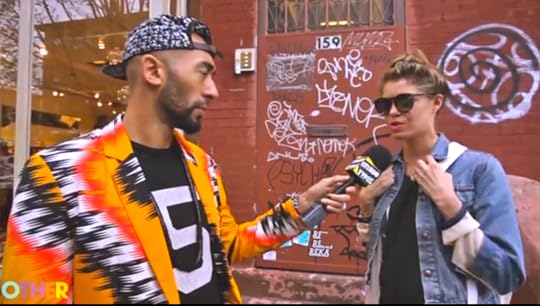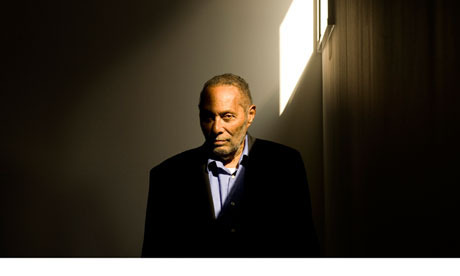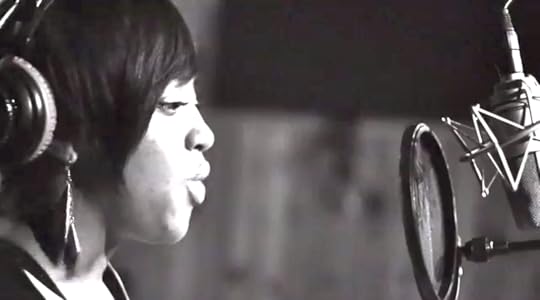Mark Anthony Neal's Blog, page 866
September 21, 2013
New Video: Rapsody--"Kingship" (feat DJ. Premier)
Published on September 21, 2013 15:22
'iamOther Presents StereoTypes": "the Female Breadwinner"
 iamOther Presents 'Stereotypes' with Ryan Hall
iamOther Presents 'Stereotypes' with Ryan HallIs it okay for a woman to financially support a man? Are female breadwinners superior to men who make less? Ryan Hall asks people on the streets of New York to weigh in on this new American economic trend. Role reversals, gender politics, and sexual dynamics are the focus of this episode of StereoTypes.
Published on September 21, 2013 11:42
'Farm to Table Family': Green Eggs & Ham
 Farm to Table Family | PBS Parents
Farm to Table Family | PBS ParentsGreen Eggs & Ham was my favorite story growing up and now it's one of my son's favorites. He gets pretty excited when we make this for breakfast together and will sometimes say a few lines as he's smearing on the sauce! I was inspired by the green eggs and ham I've tried at Huckleberry in Santa Monica and at Ad Hoc in Napa Valley. In the mornings, I need to keep things simple and quick, so for me it's all about the pesto here. Some fresh eggs and a good breakfast ham and you're done! AND it's fun!
INGREDIENTS
3-4 garlic cloves
1/4 c. parmigiano - reggiano cheese
2 c. basil leaves
1/2 lemon
1/4 c. toasted pinenuts
1 tbsp pepper
1 tbsp salt
1/2 c. olive oil
eggs
breakfast ham
GREEN EGGS & HAM RECIPE
1. To make the pesto, put the following ingredients into a food processor: garlic, cheese, basil, lemon, pinenuts, pepper, salt, olive oil.
2. Puree and add more olive oil until saucy.
3. Prepare the eggs and breakfast ham.
4. Drizzle some pesto over the eggs to make them green!
Published on September 21, 2013 11:12
Democracy Now: Benjamin Jealous on Why He Is Leaving the NAACP & Future Plans
 Democracy Now
Democracy NowBen Jealous is stepping down as president of the NAACP after a five-year term. After a busy tenure that saw him lead campaigns around issues including the death penalty, voting rights and police racial profiling, Jealous joins us to discuss his future plans: spending more time with his family, educating youth, and exploring the formation of a new political action committee.
Published on September 21, 2013 10:23
Funny Or Die: The Black NRA
Published on September 21, 2013 09:10
September 20, 2013
J. Cole--"Crooked Smile" feat. TLC (for Aiyana Stanley Jones)
Published on September 20, 2013 19:22
Classic Moments in 'The Black Fantastic': Rude-Boy Dipsy
Published on September 20, 2013 18:30
September 19, 2013
Panel: Hip-Hop in the Age of Obama @ Northeastern University | September 25, 2013
 September 25, 20136:00 pmCabral CenterFREEA conversation with Mark Anthony Neal, Marc Bamuthi Joseph, Dr. Sarah J. Jackson, Prof. Emmett G. Price III and Prof. Murray Forman
Mark Anthony Neal
is Professor of Black Popular Culture in the Department of African and African American Studies at Duke University, and the author of the following books: What the Music Said: Black Popular Music and Black Public Culture (1998), Soul Babies: Black Popular Culture and the Post-Soul Aesthetic (2002), Songs in the Keys of Black Life: A Rhythm and Blues Nation (2003) New Black Man: Rethinking Black Masculinity (2005) and Looking for Leroy: (Il)Legible Black Masculinities (2013). Neal is also the co-editor (with Murray Forman) of That’s the Joint!: The Hip-Hop Studies Reader (2004). The 2nd Edition of That’s The Joint! was published in the Fall of 2011.Professor Neal is a frequent commentator for National Public Radio and the Huffington Post. Neal is also the host of the weekly webcast ‘Left of Black.’ He was named Hip-Hop Scholar of the Year, Words, Beats and Life Foundation in 2012.
Marc Bamuthi Joseph
is one of America’s vital voices in performance, arts education, and artistic curation. In 2007, Bamuthi graced the cover of Smithsonian Magazine after being named one of America’s Top Young Innovators in the Arts and Sciences. He is the artistic director of the 7-part HBO documentary “Russell Simmons presents: Brave New Voices” and an inaugural recipient of the United States Artists Rockefeller Fellowship, which annually recognizes 50 of the country’s “greatest living artists”. He is the 2011 Alpert Award winner in Theater and in April 2012, he was one of 21 artists to be named to the inaugural class of Doris Duke Artists. He currently serves as Director of Performing Arts at Yerba Buena Center for the Arts in San Francisco.
Sarah J. Jackson’s
research and teaching interests revolve around how social and political identities are constructed in the public sphere. In particular, Dr. Jackson studies how race and gender are constructed in national debates around citizenship, inequality, and social movements. Dr. Jackson has appeared in a variety of media outlets including WCVB-Boston (ABC), The Marc Steiner Show, and Bitch magazine. Dr. Jackson’s research has appeared in journals such as The Harvard International Journal of Press Politics and Feminist Media Studies. Her book, “Black Celebrity, Racial Politics, and the Press,” is due out in 2014. Dr. Jackson teaches within the Communications Studies Department in the College of Art, Media and Design. She also serves on the executive committee of Northeastern’s Women’s, Gender and Sexuality Studies Program and advises Northeastern’s multicultural student organization NUMIX.
Prof. Emmett G Price, III
is one of the nation’s leading experts on African American Music and Culture as well as cutting edge research on bridging the generational divide. He is a noted print and broadcast media expert on African American Music and Culture, The Black Church, Hip Hop Culture and Youth Culture. Dr. Price is Associate Professor of Music.
Prof. Murray Forman
studies media and culture with a primary focus on popular music, race, and age. For over twenty years he has engaged in research about hip-hop culture, contributing to the emerging field of hip-hop studies. He is Associate Professor of Media and Screen Studies.Presented by: Northeastern Center for the Arts, Northeastern Black Student Association and the John D. O’Bryant African American InstituteThis event is in conjunction with the Northeastern University performance of
Word Becomes Flesh
on Saturday, September 28 at Blackman Auditorium.
September 25, 20136:00 pmCabral CenterFREEA conversation with Mark Anthony Neal, Marc Bamuthi Joseph, Dr. Sarah J. Jackson, Prof. Emmett G. Price III and Prof. Murray Forman
Mark Anthony Neal
is Professor of Black Popular Culture in the Department of African and African American Studies at Duke University, and the author of the following books: What the Music Said: Black Popular Music and Black Public Culture (1998), Soul Babies: Black Popular Culture and the Post-Soul Aesthetic (2002), Songs in the Keys of Black Life: A Rhythm and Blues Nation (2003) New Black Man: Rethinking Black Masculinity (2005) and Looking for Leroy: (Il)Legible Black Masculinities (2013). Neal is also the co-editor (with Murray Forman) of That’s the Joint!: The Hip-Hop Studies Reader (2004). The 2nd Edition of That’s The Joint! was published in the Fall of 2011.Professor Neal is a frequent commentator for National Public Radio and the Huffington Post. Neal is also the host of the weekly webcast ‘Left of Black.’ He was named Hip-Hop Scholar of the Year, Words, Beats and Life Foundation in 2012.
Marc Bamuthi Joseph
is one of America’s vital voices in performance, arts education, and artistic curation. In 2007, Bamuthi graced the cover of Smithsonian Magazine after being named one of America’s Top Young Innovators in the Arts and Sciences. He is the artistic director of the 7-part HBO documentary “Russell Simmons presents: Brave New Voices” and an inaugural recipient of the United States Artists Rockefeller Fellowship, which annually recognizes 50 of the country’s “greatest living artists”. He is the 2011 Alpert Award winner in Theater and in April 2012, he was one of 21 artists to be named to the inaugural class of Doris Duke Artists. He currently serves as Director of Performing Arts at Yerba Buena Center for the Arts in San Francisco.
Sarah J. Jackson’s
research and teaching interests revolve around how social and political identities are constructed in the public sphere. In particular, Dr. Jackson studies how race and gender are constructed in national debates around citizenship, inequality, and social movements. Dr. Jackson has appeared in a variety of media outlets including WCVB-Boston (ABC), The Marc Steiner Show, and Bitch magazine. Dr. Jackson’s research has appeared in journals such as The Harvard International Journal of Press Politics and Feminist Media Studies. Her book, “Black Celebrity, Racial Politics, and the Press,” is due out in 2014. Dr. Jackson teaches within the Communications Studies Department in the College of Art, Media and Design. She also serves on the executive committee of Northeastern’s Women’s, Gender and Sexuality Studies Program and advises Northeastern’s multicultural student organization NUMIX.
Prof. Emmett G Price, III
is one of the nation’s leading experts on African American Music and Culture as well as cutting edge research on bridging the generational divide. He is a noted print and broadcast media expert on African American Music and Culture, The Black Church, Hip Hop Culture and Youth Culture. Dr. Price is Associate Professor of Music.
Prof. Murray Forman
studies media and culture with a primary focus on popular music, race, and age. For over twenty years he has engaged in research about hip-hop culture, contributing to the emerging field of hip-hop studies. He is Associate Professor of Media and Screen Studies.Presented by: Northeastern Center for the Arts, Northeastern Black Student Association and the John D. O’Bryant African American InstituteThis event is in conjunction with the Northeastern University performance of
Word Becomes Flesh
on Saturday, September 28 at Blackman Auditorium.
Published on September 19, 2013 18:40
#LATISM: Digital Media's Pull For Latinos
Published on September 19, 2013 02:54
Rethinking Questions of Politics, Culture, & Identity: A Review of John Akomfrah’s The Stuart Hall Project
 Rethinking Questions of Politics, Culture, & Identity:
John Akomfrah’s The Stuart Hall Project
by Isaiah M. Wooden | special to NewBlackMan (in Exile)
Rethinking Questions of Politics, Culture, & Identity:
John Akomfrah’s The Stuart Hall Project
by Isaiah M. Wooden | special to NewBlackMan (in Exile)When an adolescent Stuart Hall first encountered modern jazz as a student in colonial Jamaica, he heard in it the sounds of revolution. Jazz, particularly the various musical moods of legendary trumpeter and composer Miles Davis, activated in Hall a desire to think life beyond the middle-class, Colored, colonial existence so deeply prized by his family, especially his mother: “I felt this kind of opening in the world…I knew that it was a world from the margins; it opened up the possibility of really experiencing modern life to the fuller. It formed in me the aspiration to go and get it, wherever it was.” Embedded in the musical genre’s refusal of convention and its embrace of improvisation, Hall discovered guideposts for reframing and rethinking larger questions of politics, culture, identity and their discontinuities. Hall would make rigorous engagements with such questions his life’s work.
The Stuart Hall Project , documentarian John Akomfrah’s deeply affecting cinematic essay on Hall, traces the evolutions of that life’s work. And, appropriately, Akomfrah scores the film with the sounds of revolution: the jazz of Miles Davis.
The Stuart Hall Project offers a kaleidoscopic portrait of Hall as a vocal leader of Britain’s New Left, architect of Cultural Studies, and influential post-war theorist and public intellectual. Assembling an eclectic mix of archival materials, including television interviews, home movies and family photos, the film also provides glimpses of Hall as a son, brother, husband and father. Akomfrah, eschewing linearity, gives thoughtful attention to both the extraordinary and the everyday in the film. He places footage of catalytic international events--the 1956 Hungarian Uprising, various movements against colonial rule, the Vietnam War, among many others—in conversation with images of Hall on the beach with his young family and recordings of him at the Partisan, the Oxford coffee shop that Hall cofounded with several of his Universities and Left Review comrades, for example.
These shuttles back and forth across time and space, which Hall often narrates in voiceover, are not meant to supply a totalized view of the shifts in Hall’s intellectual, political, and personal commitments. Instead, they document the ways those affinities often remained in process and, importantly, serve to example Hall’s own assertion that “identity is always constructed in a conversation between who we are and the political ideologies out there.” Hall began developing an understanding of this conception of identity at a very early age.
Raised in what he describes as “the most exquisitely differentiated class and color system in the world,” Hall’s dark skin—he was three shades darker than his family—was a source of tremendous consternation for his mother, a woman deeply attached to the privileges afforded to lightness and whiteness. “My childhood was the experience of passing through a negative set of definitions. My parents patrolled who I could and couldn’t bring home. They had to be the right class, the right color, have the right education. They had to have the right background, the right name,” Hall recounts. Attending Oxford on a Rhodes scholarship was the apotheosis of everything that his mother had wanted for Hall. Of course, it was at Oxford that Hall came to understand fully the impossibility of his mother’s ambition to become “English.” It was also at Oxford that Hall first began to interrogate seriously the questions that would later preoccupy him and many of his New Left interlocutors.
The Stuart Hall Project is as much a commemoration of the emergence and evolution of the New Left as it is a tribute to one of its most formidable thinkers. Akomfrah recovers from the archive audio and video clips, including the footage of Hall at the Partisan, that capture the spirit of radical debate that marked Hall’s early days as a steward of the New Left’s intellectual projects. What resonates in those and many other clips is Hall’s steadfast desire to remain in conversation with and accessible to diverse communities even while attempting to engage new and sometimes complicated analyses of the social relations and cultural dynamics of post-war capitalism and to articulate an expanded conception of the political.
Hall’s candidness in the film about things that fundamentally altered his way of thinking is especially striking. Feminism, he admits, had an unanticipated and profound impact on him and Cultural Studies, which, in its early stages, had been mostly concerned with class questions (and, thus, male questions). Indeed, Hall acknowledges that, for him, feminism surfaced the distinctions between adopting certain convictions intellectually and actually adjusting the ways you live and relate: it forced him to question his own attachments to certain gender and sexual norms.
In recycling and effectively manipulating materials from the past, Akomfrah invites deep reflection of Hall, a figure who remains dedicated to advancing social, political, and epistemic change, while taxing the boundaries of the cinematic form with The Stuart Hall Project. The result is a stirring film that sophisticatedly deploys montage to map the various elements and different pathways that proved critical in the makings of Hall’s many identities. And, powerfully, accompanying it all are the sounds of Miles Davis. At 18 or 19, Hall recalls early in the film, Davis managed to put a finger on his soul. With The Stuart Hall Project, Akomfrah manages to capture Hall’s heart.
***
Isaiah M. Wooden is a writer, performance-maker and doctoral candidate in Theater and Performance Studies at Stanford University. He’s spending the 2013-2014 academic year as a guest artist in Theater and Performance Studies at Georgetown University. You can follow him on twitter @black_nostalgic.
Published on September 19, 2013 02:19
Mark Anthony Neal's Blog
- Mark Anthony Neal's profile
- 30 followers
Mark Anthony Neal isn't a Goodreads Author
(yet),
but they
do have a blog,
so here are some recent posts imported from
their feed.








